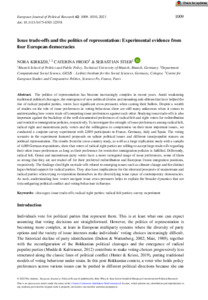|
Issue trade-offs and the politics of representation: experimental evidence from four European democracies
Kirkizh, Nora
;
Froio, Caterina
;
Stier, Sebastian
![[img]](https://madoc.bib.uni-mannheim.de/67939/1.hassmallThumbnailVersion/European%20J%20Political%20Res%20-%202022%20-%20KIRKIZH%20-%20Issue%20trade%E2%80%90offs%20and%20the%20politics%20of%20representation%20Experimental%20evidence%20from.pdf)  Vorschau |
|
PDF
European J Political Res - 2022 - KIRKIZH - Issue trade‐offs and the politics of representation Experimental evidence from.pdf
- Veröffentlichte Version
Download (358kB)
|
|
DOI:
|
https://doi.org/10.1111/1475-6765.12558
|
|
URL:
|
https://ejpr.onlinelibrary.wiley.com/doi/10.1111/1...
|
|
Weitere URL:
|
https://www.researchgate.net/publication/364522368...
|
|
URN:
|
urn:nbn:de:bsz:180-madoc-679398
|
|
Dokumenttyp:
|
Zeitschriftenartikel
|
|
Erscheinungsjahr:
|
2023
|
|
Titel einer Zeitschrift oder einer Reihe:
|
European Journal of Political Research
|
|
Band/Volume:
|
62
|
|
Heft/Issue:
|
4
|
|
Seitenbereich:
|
1009-1030
|
|
Ort der Veröffentlichung:
|
Oxford
|
|
Verlag:
|
Wiley-Blackwell
|
|
ISSN:
|
0304-4130 , 1475-6765
|
|
Sprache der Veröffentlichung:
|
Englisch
|
|
Einrichtung:
|
Fakultät für Sozialwissenschaften > Computational Social Science (Stier 2023-)
|
|
Bereits vorhandene Lizenz:
|
 Creative Commons Namensnennung, nicht kommerziell 4.0 International (CC BY-NC 4.0) Creative Commons Namensnennung, nicht kommerziell 4.0 International (CC BY-NC 4.0)
|
|
Fachgebiet:
|
320 Politik
|
|
Abstract:
|
The politics of representation has become increasingly complex in recent years. Amid weakening traditional political cleavages, the emergence of new political divides and mounting anti-elitism that have helped the rise of radical populist parties, voters face significant cross-pressures when casting their ballots. Despite a wealth of studies on the role of issue preferences in voting behaviour, there are still many unknowns when it comes to understanding how voters trade off competing issue preferences against each other. Studying issue trade-offs is also important against the backdrop of the well-documented preferences of radical left and right voters for redistribution and restrictive immigration policies, respectively. To investigate the strength of issue preferences among radical left, radical right and mainstream party voters and the willingness to compromise on their most important issues, we conducted a conjoint survey experiment with 2,000 participants in France, Germany, Italy and Spain. The voting scenario in the experiment featured proposals on salient political issues and different (non)populist stances on political representation. The results from the cross-country study, as well as a large replication study with a sample of 4,000 German respondents, show that voters of radical right parties are willing to accept large trade-offs regarding their other issue preferences as long as their preference for restrictive immigration policies is fulfilled. Differently, radical left, Green and mainstream party voters have a more variegated range of issue preferences, some of them so strong that they are not traded off for their preferred redistribution and European Union integration positions, respectively. The findings shed light on trade-offs related to emerging issues such as climate change and the distinct logics behind support for radical parties. They also have implications for the electoral prospects of mainstream and radical parties when trying to reposition themselves in the diversifying issue space of contemporary democracies. As such, understanding how voters navigate issue cross-pressures helps to explain the broader dynamics that are (re)configuring political conflict and voting behaviour in Europe.
|
 | Dieser Eintrag ist Teil der Universitätsbibliographie. |
 | Das Dokument wird vom Publikationsserver der Universitätsbibliothek Mannheim bereitgestellt. |
 | Dieser Datensatz wurde nicht während einer Tätigkeit an der Universität Mannheim veröffentlicht, dies ist eine Externe Publikation. |
 Suche Autoren in Suche Autoren in
Sie haben einen Fehler gefunden? Teilen Sie uns Ihren Korrekturwunsch bitte hier mit: E-Mail
Actions (login required)
 |
Eintrag anzeigen |
|
|
 ORCID: 0000-0002-1217-5778
ORCID: 0000-0002-1217-5778



 Creative Commons Namensnennung, nicht kommerziell 4.0 International (CC BY-NC 4.0)
Creative Commons Namensnennung, nicht kommerziell 4.0 International (CC BY-NC 4.0) Suche Autoren in
Suche Autoren in